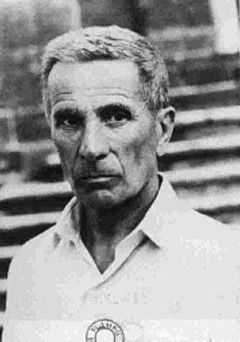- Dino Buzzati
-
Dino Buzzati 
Born 16 October 1906
San Pellegrino, ItalyDied 28 January 1972
Milan, ItalyOccupation Graphic artist, novelist, short story writer, journalist Nationality Italian Genres Novel, short story Literary movement Existentialism, magical realism Notable work(s) Il deserto dei Tartari
InfluencesDino Buzzati-Traverso (16 October 1906 – 28 January 1972) was an Italian novelist, short story writer, painter and poet, as well as a journalist for Corriere della Sera. His worldwide fame is mostly due to his novel Il deserto dei Tartari, translated into English as The Tartar Steppe.
Contents
Life
Buzzati was born at San Pellegrino, Belluno, in his family's ancestral villa. Buzzati's mother, a veterinarian by profession, was Venetian and his father, a professor of international law, was from an ancient Bellunese family. Buzzati was the second of his parents' four children. In 1924, he enrolled in the law faculty of the University of Milan, where his father once taught. As he was completing his studies in law, he was hired, at the age of 22, by the Milanese newspaper Corriere della Sera, where he would remain until his death. He began in the corrections department, and later worked as a reporter, special correspondent, essayist, editor and art critic. It is often said that his journalistic background informs his writing, lending even the most fantastic tales an aura of realism.
Buzzati himself comments on the connection (as cited by Lawrence Venuti):
It seems to me, fantasy should be as close as possible to journalism. The right word is not "banalizing", although in fact a little of this is involved. Rather, I mean that the effectiveness of a fantastic story will depend on its being told in the most simple and practical terms.[1]
During World War II, Buzzati served in Africa, as a journalist attached to the Regia Marina. After the end of the war, Il deserto dei Tartari was published Italy-wide and quickly brought critical recognition and fame to the author. He married Almeria Antoniazzi in 1964, which also marked the release of his last novel, Un amore. In 1972, Buzzati died of cancer after a protracted illness.
Works summary
Buzzati began writing fiction in 1933. His works of fiction include five novels, theatre and radio plays, librettos, numerous books of short stories and poetry. His librettos include four for operas by Luciano Chailly, as well as that of the opera La giacca dannata by Giulio Viozzi.
He wrote a children's book La famosa invasione degli orsi in Sicilia (translated by Frances Lobb into English as The Bears' Famous Invasion of Sicily). Lemony Snicket wrote an introduction and reader's companion to a 2005 English edition.
Also an acclaimed and exhibited artist, Buzzati also combined his artistic and writerly exploits into making a comic book based on the myth of Orpheus, Poema a fumetti.
The Tartar Steppe, his most famous novel, tells the story of a military outpost that awaits a Tartar invasion. In its sentiment and its conclusions, it has been compared to existentialist works, notably Albert Camus's The Myth of Sisyphus.[2]
His writing is sometimes cited as magical realism, social alienation, and the fate of the environment and of fantasy in the face of unbridled technological progress are recurring themes. He has also written a variety of short stories featuring fantastic animals such as the bogeyman and, his own invention, the colombre (il colombre).
Bibliography
- Bàrnabo delle montagne (Barnabo of the Mountains, 1933)
- Il segreto del Bosco Vecchio (1935)
- Il deserto dei Tartari (The Tartar Steppe, 1940)
- I Sette Messaggeri (The Seven Messengers, 1942 - short stories)
- La famosa invasione degli orsi in Sicilia (The Bears' Famous Invasion of Sicily, 1945)
- Il grande ritratto (1960)
- Un amore (A Love Affair, 1963)
- Il capitano Pic e altre poesie (1965, poetry)
- Il colombre (1966, Short stories)
- Poema a Fumetti (Poem Strip, 1969—graphic novel)
References
- Giuseppe Leone, "Dino Buzzati e le grandi "costruzioni" letterarie - La "fortezza di Bastiani" non è "Il castello" di Kafka", Il Punto Stampa, Lecco, Italy, April 1997.
External links
- Biography on IMDb
- Biography (Italian)
Strega Prize-winning authors Ennio Flaiano (1947) · Vincenzo Cardarelli (1948) · Giovanni Battista Angioletti (1949) · Cesare Pavese (1950) · Corrado Alvaro (1951) · Alberto Moravia (1952) · Massimo Bontempelli (1953) · Mario Soldati (1954) · Giovanni Comisso (1955) · Giorgio Bassani (1956) · Elsa Morante (1957) · Dino Buzzati (1958) · Giuseppe Tomasi di Lampedusa (1959) · Carlo Cassola (1960) · Raffaele La Capria (1961) · Mario Tobino (1962) · Natalia Ginzburg (1963) · Giovanni Arpino (1964) · Paolo Volponi (1965) · Michele Prisco (1966) · Anna Maria Ortese (1967) · Alberto Bevilacqua (1968) · Lalla Romano (1969) · Guido Piovene (1970) · Raffaello Brignetti (1971) · Giuseppe Dessì (1972) · Manlio Cancogni (1973) · Guglielmo Petroni (1974) · Tommaso Landolfi (1975) · Fausta Cialente (1976) · Fulvio Tomizza (1977) · Ferdinando Camon (1978) · Primo Levi (1979) · Vittorio Gorresio (1980) · Umberto Eco (1981) · Goffredo Parise (1982) · Mario Pomilio (1983) · Pietro Citati (1984) · Carlo Sgorlon (1985) · Maria Bellonci (1986) · Stanislao Nievo (1987) · Gesualdo Bufalino (1988) · Giuseppe Pontiggia (1989) · Sebastiano Vassalli (1990) · Paolo Volponi (1991) · Vincenzo Consolo (1992) · Domenico Rea (1993) · Giorgio Montefoschi (1994) · Mariateresa Di Lascia (1995) · Alessandro Barbero (1996) · Claudio Magris (1997) · Enzo Siciliano (1998) · Dacia Maraini (1999) · Ernesto Ferrero (2000) · Domenico Starnone (2001) · Margaret Mazzantini (2002) · Melania Gaia Mazzucco (2003) · Ugo Riccarelli (2004) · Maurizio Maggiani (2005) · Sandro Veronesi (2006) · Niccolò Ammaniti (2007) · Paolo Giordano (2008) · Tiziano Scarpa (2009)Categories:- 1906 births
- 1972 deaths
- People from Belluno
- Existentialists
- Italian novelists
- Italian short story writers
- Italian sports journalists
- Italian journalists
- Italian children's writers
- Strega Prize winners
- Deaths from pancreatic cancer
- Italian librettists
- Opera librettists
- Cancer deaths in Italy
Wikimedia Foundation. 2010.
